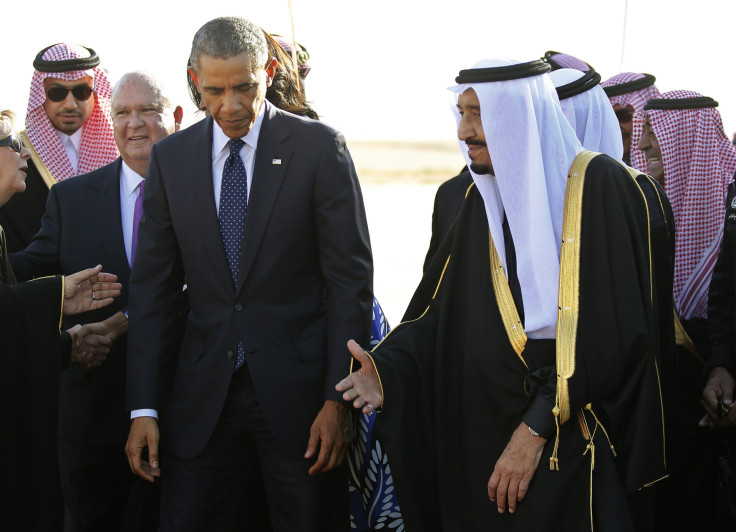Why Is Obama Visiting Saudi Arabia? Heavyweight US Delegation To Smooth Ties With Kingdom’s New Ruler

President Barack Obama arrived in Saudi Arabia Tuesday to offer condolences for the death of King Abdullah and to pay respects to the oil-rich kingdom’s new ruler, King Salman. The president led a large bipartisan delegation of prominent U.S. officials on the visit, highlighting the importance of the U.S.-Saudi alliance amid ongoing regional tumult.
Among those joining Obama to pay their respects in Riyadh were CIA Director John Brennan, Gen. Lloyd Austin, the head of U.S. Central Command forces in the region, and Republican Sen. John McCain, according to the Guardian. Secretary of State John Kerry and leading House Democrats Nancy Pelosi and Joe Crowley were also scheduled to visit the king’s palace on the trip.
While the visit’s official purpose is to offer Washington’s condolences over the death of Abdullah, who passed away last week at 90, officials have conceded that the underlying objective of the trip was to ensure that U.S. interests in the region were not affected by the handover of power, said the Guardian. King Salman’s ascension to the throne comes after a period of sometimes tense relations between Washington and Riyadh. The Saudi leadership has had disputes with the Obama administration over ongoing international negotiations with regional rival Iran over the Islamic Republic’s nuclear program. The kingdom has also expressed its frustrations with the White House over its failure to do more to oust Syrian President Bashar al-Assad, according to Reuters.
Salman has given no public indication of his stance on international issues, but analysts suggest he shares his predecessor’s frustrations with Washington’s Middle East policies, reported the New York Times. As the region experiences increasing tumult, the kingdom is seen by some as a crucial bulwark against instability. Former Secretary of State James A. Baker, who accompanied Obama on his Riyadh visit, told the Times that it was important to show the Saudis how much the U.S. values their relationship. “This is an extraordinarily critical and sensitive time in the Middle East, when everything seems to be falling apart. And the kingdom in some ways is becoming an island of stability,” he said.
The fight against the Islamic State militant group that seized swathes of territory in Syria and Iraq last year has renewed the importance of the security partnership between the two longtime allies. The fall of the Yemeni government last week to rebel Houthi insurgents is another point of concern for Riyadh and Washington as the most aggressive al Qaeda affiliate operates in Yemen.
© Copyright IBTimes 2025. All rights reserved.






















